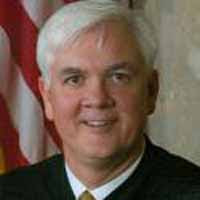Federal judge issues order exempting all religious services from Beshear’s order against gatherings of more than 10 people

Judge Gregory Van Tatenhove
—–
A federal judge has ruled that Kentucky churches can resume in-person worship without fear that police and health officials will enforce Gov. Andy Beshear’s emergency order banning gatherings of more than 10 people during the coronavirus pandemic.
U.S. District Judge Gregory Van Tatenhove issued a temporary restraining order Friday in a lawsuit filed Wednesday by Tabernacle Baptist Church of Nicholasville. At the request of Attorney General Daniel Cameron, he made it statewide, saying Beshear and Health Secretary Eric Friedlander could not enforce “the prohibition on mass gatherings with respect to any in-person religious service which adheres to applicable social-distancing and hygiene guidelines.” The church said it would follow those guidelines, and the judge made that a condition of his order.
Van Tatenhove’s language appears to permit the guidelines that Beshear issued Friday for in-person religious services beginning May 20, which include limiting attendance to one-third of capacity, maintaining six feet of physical distance between attendees, not providing communal food or beverages, avoiding handshaking and hugs, wearing masks or face coverings, and avoiding live choir or singing.
“Two other federal judges in Kentucky — David Hale of Louisville and William Bertelsman of Covington — had previously ruled that the ban on in-person church services was constitutional,” reports Andrew Wolfson of the Louisville Courier Journal. “But after the 6th U.S. Circuit Court of Appeals sent the case back to Hale, he also issued an injunction Friday night against enforcement of the order, pending the state’s appeal.”
That case was filed by Maryville Baptist Church in Hillview, which Beshear has said is the only church he knows of that has violated his order, and the only one where attendees were given notices to self-quarantine. But in a footnote to his 13-page opinion, Van Tatenhove wrote, “The governor, to this point in the litigation, evinces an intent to continue enforcing the orders at issue.”
UPDATE, May 9: “Saturday, three judges for the U.S. Court of Appeals in Cincinnati granted Maryville an injunction pending appeal, which also allows in-person services at the church, reports Karla Ward of the Lexington Herald-Leader. “The order said that three congregants wanted to meet for in-person worship on Sunday.”
In the two cases and the political rhetoric around the issue, opponents of Beshear’s order have argued that it is unconstitutional to prohibit in-person worship when customers patronize businesses that Beshear had deemed essential. During a telephone hearing Friday, Van Tatenhove paraphrased a part of the church’s complaint and asked an attorney for Beshear, “Why can someone safely walk down a grocery store aisle and not a pew?”
Beshear attorney Travis Mayo said shopping is “transitory,” something that is concluded after purchases are made, while worship services have “congregants sit near one another for an hour or more,” Wolfson reports. “Matthew Martens, a Washington lawyer for the church, said there is no time limit for shopping under Beshear’s order that allows visits to stores offering essential services. And Van Tatenhove, who was appointed by President George W. Bush, said during the hearing that the state introduced no scientific evidence that church services are inherently more dangerous.”
There is evidence that singing creates aerosols that can spread viruses, but it hasn’t been presented to Van Tatenhove, who wrote, “Evidence that the risk of contagion is heightened in a religious setting any more than a secular one is lacking. If social distancing is good enough for Home Depot and Kroger, it is good enough for in-person religious services which, unlike the foregoing, benefit from constitutional protection.”
At the start of his opinion, Van Tatenhove wrote, “This is a hard and difficult time. A new virus sweeps the world, ravages our economy and threatens our health. Public officials, including the defendants in this case, make minute-by-minute decisions with the best of intentions and the goal of saving the health and lives of our citizens. But what of that enduring Constitution in times like these? Does it mean something different because society is desperate for a cure or prescription?”